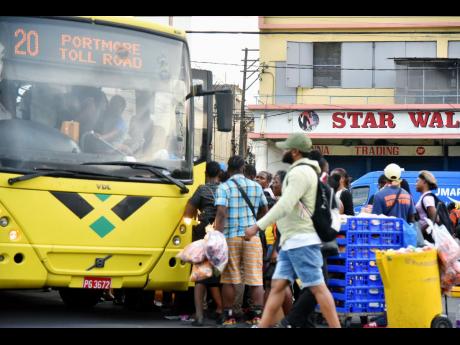Editorial | Reimagine public transport
Daryl Vaz’s disclosure of the Jamaica Urban Transit Company’s (JUTC) plan to eke new life out of the large, inoperable chunk of its aged fleet, seems an economically sensible idea.
For, according to Mr Vaz, not only can the buses be repaired at a quarter of the cost of purchasing new ones, the overhauls will add a decade to the operating life of the vehicles.
However, before the JUTC finalises this deal, the transport minister, for the sake of transparency, and so as to assure taxpayers that they are getting fair value for their money, must take the details of the arrangement to Parliament for oversight and review. He, after all, would not wish the auditor general (AuG) to again raise questions about maintenance arrangements for JUTC fleet, as was the case in Pamela Monroe Ellis’ 2020 management audit of the bus company.
But as he moves to expand and renew the JUTC’s flee, and attempts to bring a semblance of order to the dysfunctional transportation system, Mr Vaz, ought, by now, to be aware that his efforts – like those of his several predecessors– are, without more, akin to to using chewing gum to kotch, and stabilise, a complex, and multi-storied edifice. It’s impractical.
He must, if he wishes to be a successful minister of this portfolio, formulate a long-term, multi-sectoral public transportation policy, that covers everything, from how and where roads are built, to the modes of transportation required to move commuters efficiently, the economic support that taxpayers should be reasonably required to provide this service and whether, or how, ownership of private vehicles should be regulated and/or priced.
FRAUGHT ISSUE
Public transportation has been a fraught issue in Jamaica for decades, exacerbated by the 1980s closure of the Jamaica Omnibus Service (JOS) and the infiltration of the system by individually owned and operated private buses and route taxis.
The government’s establishment of the JUTC in the 1990s was to bring a semblance of order to commuter travel in the Kingston Metropolitan Region (KMR) where around a fifth of Jamaica’s population lives. The JUTC was expected to operate on major (trunk) routes and franchise some subsidiary routes to smaller bus operators. Route taxis would supplement the JUTC’s service in the KMR.
However, it is the route taxis that have come to define Jamaica’s public transport system. A kind of organised chaos.
Even if they may be uneasy that the route taxis (whose fares the government has kept artificially low) race each other and defy road rules as they hustle for business, commuters like the fact that they are plentiful and get passengers to their destinations quickly.
On the other hand, the JUTC – which last year carried an estimated 14.8 million passengers – isn’t an inexpensive venture for taxpayers, although it falls far short of meeting seat demands. In the fiscal year that ended in March, the JUTC’s lost an estimated $7.4 billion on its operations, which was cushioned by a direct government subsidy of $8.3 billion, thus allowing the company to report a net loss of only $1.4 billion. The projected operating loss for the current fiscal year is approximately $16 billion, of which $9.4 billion will be off-set by the government’s grant.
With the projected accumulated deficit of $16.3 and total assets of $12.26 billion, shareholders’ (taxpayers) funding has kept the company from insolvency.
TRANSPARENT
This newspaper isn’t against public financial support for the JUTC, or the public transport sector in general, if that support underpins an efficient commuter system, in the context of developing a competitive economy. Those flows, however, must be transparent and used for their intended purpose.
Which is why Mr Vaz must provide further and better particulars about the JUTC’s plan for “the refurbishing of some of the existing buses by the manufacturer’s representative which will give us another 10 years”.
The JUTC, the minister said, should operate around 600 buses daily. It now rolls-out around 40 per cent of that number. It has 170 buses on order, most of which will arrive over the summer. So, there will still be a shortfall.
The JUTC must say how many of its buses are idle, how many can, and will be repaired, at what cost, by when and by whom. And who will undertake the repairs must be bankable.
In her 2020 audit of the JUTC Ms Monroe Ellis reported that a previous purchase agreement for JUTC buses had an arrangement for the training of the company’s technicians to repair the fleet. Yet, the supplier’s representative in Jamaica was paid $100 million to service the buses. That level of mismanagement can’t continue. Yet, it was only a small part of the weak accountability highlighted in that audit.
Meanwhile, Mr Vaz should begin that conversation on a rational and rationalised transportation, taking into account the US$417.3 million Jamaica spent on passenger motor vehicles in 2023, the US$160 million on spare parts and accessories and around US$200 million in petrol to run these vehicles. These figures don’t take into account the cost and operational treadmill on which the government finds itself in expanding and building new roads to accommodate an increasing number of vehicles.
Indeed, it’s illogical, and a monumental waste of man hours, for thousands of vehicles, most with a single passenger (the driver) to be daily stuck in traffic gridlock for hours.

